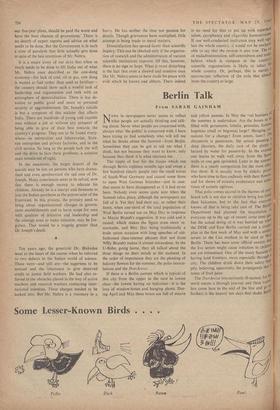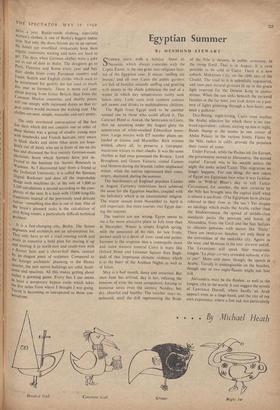Berlin Talk
G A,INHAM From SARAH
NEws in newspapers never seems to reflect what people are actually thinking and talk- ing about. Never what people are concerned with, always what 'the public' is concerned with. 1 have been trying to find somebody who will tell me what he thinks about the Summit—from Berjin. Sometimes they can be got to ask me what I think, but not because they want to know, only because they think it is what interests me.
The ripple of fear for the future which ran through Berlin eighteen months ago and swept a few hundred elderly people into the small towns of South-West Germany and caused some firms to open West German branches—just in case; that seems to have disappeared as if it had never been. Nobody even seems quite sure when the Summit takes place, although the newspapers are full of it. Yet they had their say, or rather their listen, when one-third of the total population of West Berlin turned out on May Day in response to Mayor Brandt's suggestion. It was cold and it rained, which makes the figure even more re- markable, and May Day being traditionally a trade union occasion with long speeches of old- fashioned class-interest phrases (but not from Willy Brandt) makes it almost miraculous. In the U-Bahn, going home, they all talked about the three things on their minds at the moment. In the order of importance they are the planting of balcony flowers for the summer, the polio innocu- lations and the Durchreise.
If there is a Berlin custom which is typical of this city from the upper to the next to lowest class—the lowest having no balconies—it is the love of window-boxes and hanging plants. Dur- ing April and May these boxes are full of mauve and yellow pansies. In May the -cal business 01 the summer is undertaken. Are the boxes 1U be filled with geraniums, lobelia, primulas, fuel begonias small or begonias large? Hanging car' nations for a change? Even asters, later? The discussion is passionate, the actual planting deep pleasure, the daily care of the plants 3 hazard by water for passers-by. In the evening one learns to walk well away from the house walls or one gets sprinkled. Later in the summer there is a yearly competition for the most effee. five show. It is usually won by elderly people who have time to fuss endlessly with their flowers' and for shows of ecstatic exuberance and some times of ecstatic ugliness. That polio comes second in the themes of over heard talk is not due to children being less loved than balconies, but to the fact that everyone knows all that is being take care of The Haiti, Department had planned the inoculation everyone up to the age of twenty some time ; bt but the actual doing of it was hurried up When the DDR and East Berlin carried out a similar plan in the first week of May and with a similar serum to the Cox method to be used in West Berlin. There has been some official anxiety that the live serum might cause infection in children not yet immunised. One of the many hazards °f having land frontiers, more especially throne' 3 city. The children drink down their safety ti pily, believing, apparently, the propaganda that it tastes of fruit juice. the The Durchreise (mysteriously ill-named, for el' word means a through journey and these tra no lers come here to the end of the line and g° lin farther) is•the buyers' ten days that shake Be twice a year Ready-made clothing, especially women's clothes, is one of Berlin's biggest indus- tries. Not only the dress houses are in an uproar, the hotels are overfilled, restaurants keep their regular customers waiting and taxis are hard to get. The days when German clothes were a joke are as out of date as Stalin. The designers go to Paris. Florence and Rome every year and buy their cloths from every European country and Japan. Scotch and English cloths which used to be paramount for quality are not used so much this year as formerly. There is more red tape about buying from Great Britain than from the Common Market countries, and shortly prices will rise steeply with increased duties so that re- peat orders would increase the making cost. The clothes are neat, simple, wearable and very pretty.
The only overheard conversation of The last few days which did not concern one or other of these themes was a group of erudite young men with notebooks and French haircuts, very smart in black slacks and shirts (blue jeans are hope- lessly out of date), who sat in front of me on the bus and discussed the first entirely German-made electronic brain which Siemens have just de- livered to the Institute for Atomic Research in Wannsee. As I discovered later from a friend at the Technical University, it is called the Siemens Digital Reckoner and does all the improbable things such machines do, at the rate of 1,800 to 2.200 calculations a second according to the com- plexity of the sum. It is built with 15,000 long-life transistors instead of the previously used delicate valves—something else that is out of date. One of the brain's planned tasks is the calculation of civil flying routes, a particularly difficult technical Problem.
It is a fast-changing city, Berlin. The Senate engineers and architects are an adventurous lot. They only have to see a road running north and south to conceive a bold plan for tearing it up and turning it to north-east and south-west with a flyover here and a clover-leaf there, centred by an elegant piece of sculpture. Compared to the foreign architects' planning in the Hansa quarter, the new native buildings are solid, hand- Some and spacious. All this makes getting about rather a guessing game. Every bus I use seems to have a temporary bypass route which takes me five miles from where 1 thought I was going. Travel is becoming as unexpected as those con- versations.







































 Previous page
Previous page